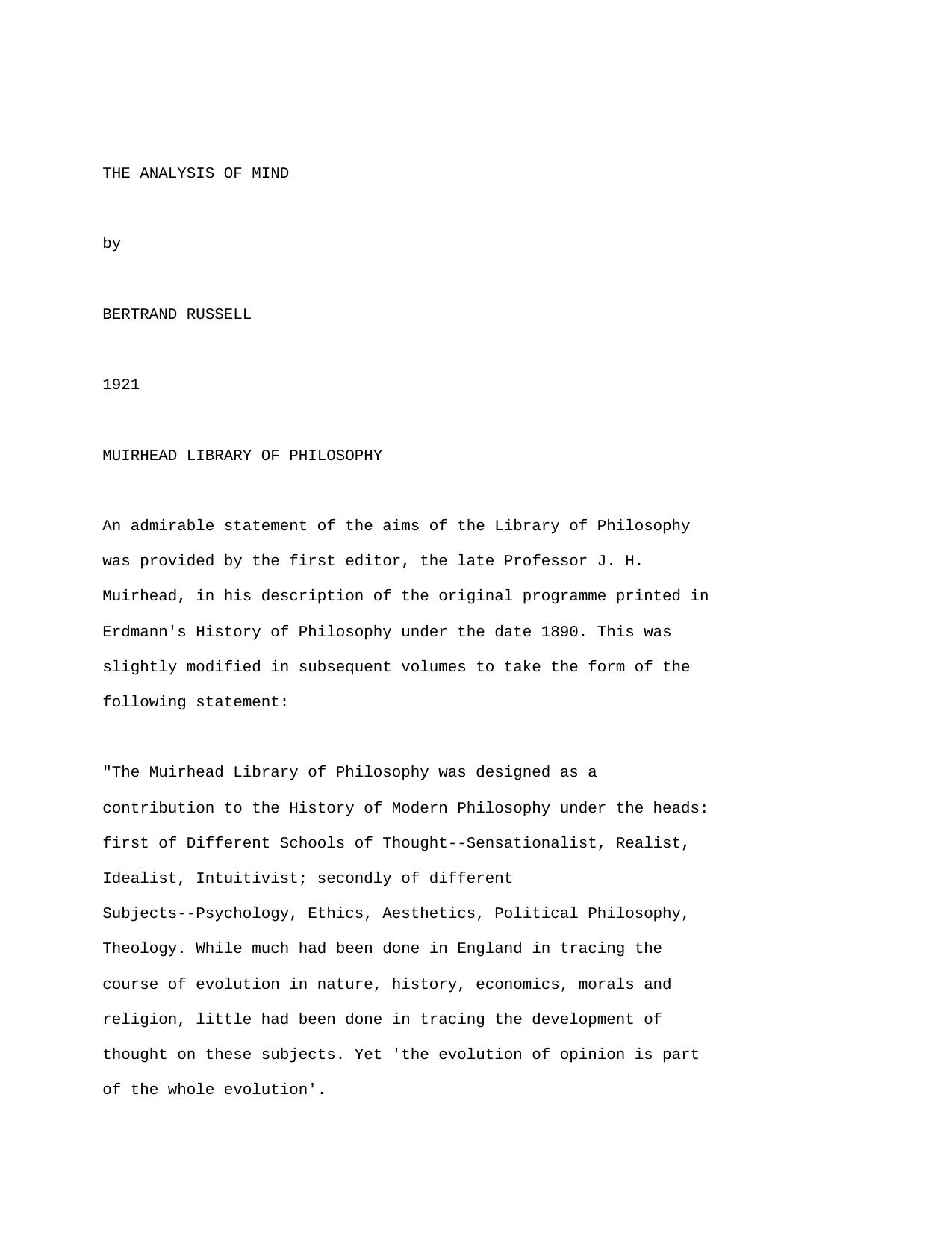The Analysis of Mind by Bertrand Russell

Author:Bertrand Russell [Russell, Bertrand]
Language: eng
Format: epub, pdf
Tags: Psychology, Consciousness, Knowledge, Theory of
Published: 2001-01-31T16:00:00+00:00
* See his "Life and Habit and Unconscious Memory."
We often feel that something in our sensible environment is familiar, without having any definite recollection of previous occasions on which we have seen it. We have this feeling normally in places where we have often been before—at home, or in well-known streets. Most people and animals find it essential to their happiness to spend a good deal of their time in familiar surroundings, which are especially comforting when any danger threatens. The feeling of familiarity has all sorts of degrees, down to the stage where we dimly feel that we have seen a person before. It is by no means always reliable; almost everybody has at some time experienced the well-known illusion that all that is happening now happened before at some time. There are occasions when familiarity does not attach itself to any definite object, when there is merely a vague feeling that SOMETHING is familiar. This is illustrated by Turgenev's "Smoke," where the hero is long puzzled by a haunting sense that something in his present is recalling something in his past, and at last traces it to the smell of heliotrope. Whenever the sense of familiarity occurs without a definite object, it leads us to search the environment until we are satisfied that we have found the appropriate object, which leads us to the judgment: "THIS is familiar." I think we may regard familiarity as a definite feeling, capable of existing without an object, but normally standing in a specific relation to some feature of the environment, the relation being that which we express in words by saying that the feature in question is familiar. The judgment that what is familiar has been experienced before is a product of reflection, and is no part of the feeling of familiarity, such as a horse may be supposed to have when he returns to his stable. Thus no knowledge as to the past is to be derived from the feeling of familiarity alone.
A further stage is RECOGNITION. This may be taken in two senses, the first when a thing not merely feels familiar, but we know it is such-and-such. We recognize our friend Jones, we know cats and dogs when we see them, and so on. Here we have a definite influence of past experience, but not necessarily any actual knowledge of the past. When we see a cat, we know it is a cat because of previous cats we have seen, but we do not, as a rule, recollect at the moment any particular occasion when we have seen a cat. Recognition in this sense does not necessarily involve more than a habit of association: the kind of object we are seeing at the moment is associated with the word "cat," or with an auditory image of purring, or whatever other characteristic we may happen to recognize in the cat of the moment. We are, of course, in fact able to judge, when we recognize an object, that we
Download
This site does not store any files on its server. We only index and link to content provided by other sites. Please contact the content providers to delete copyright contents if any and email us, we'll remove relevant links or contents immediately.
The remains of the day by Kazuo Ishiguro(8965)
Tools of Titans by Timothy Ferriss(8360)
Giovanni's Room by James Baldwin(7316)
The Black Swan by Nassim Nicholas Taleb(7098)
Inner Engineering: A Yogi's Guide to Joy by Sadhguru(6784)
The Way of Zen by Alan W. Watts(6591)
Asking the Right Questions: A Guide to Critical Thinking by M. Neil Browne & Stuart M. Keeley(5751)
The Power of Now: A Guide to Spiritual Enlightenment by Eckhart Tolle(5742)
The Six Wives Of Henry VIII (WOMEN IN HISTORY) by Fraser Antonia(5493)
Astrophysics for People in a Hurry by Neil DeGrasse Tyson(5172)
Housekeeping by Marilynne Robinson(4434)
12 Rules for Life by Jordan B. Peterson(4298)
Double Down (Diary of a Wimpy Kid Book 11) by Jeff Kinney(4257)
The Ethical Slut by Janet W. Hardy(4240)
Skin in the Game by Nassim Nicholas Taleb(4232)
Ikigai by Héctor García & Francesc Miralles(4232)
The Art of Happiness by The Dalai Lama(4120)
Skin in the Game: Hidden Asymmetries in Daily Life by Nassim Nicholas Taleb(3986)
Walking by Henry David Thoreau(3950)
